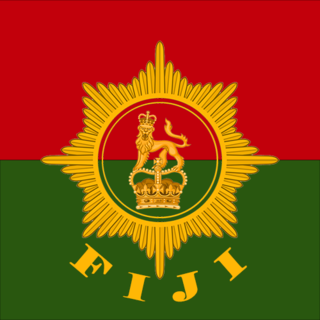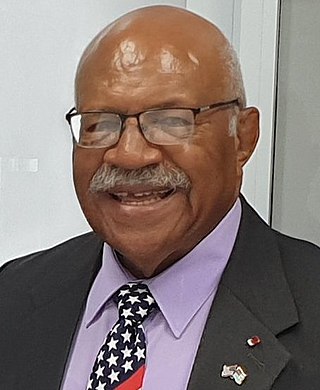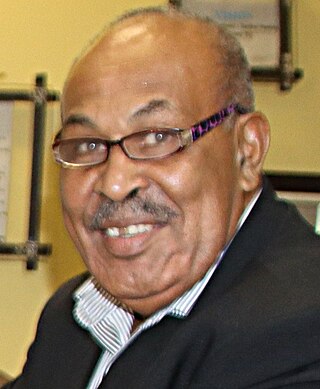Related Research Articles

The Republic of Fiji Military Forces is the military force of the Pacific island nation of Fiji. With a total manpower of about 4,500 active soldiers and approximately 6,200 reservists, it is one of the smallest militaries in the world and the third largest in the South Pacific region. The Ground Force is organised into six infantry and one engineer battalions.

Brigadier-General Ratu Epeli Nailatikau, is a Fijian chief who was President of Fiji from 2009 to 2015. He has had a long career in the Military, diplomatic service, and government. From 2001 to 2006 he served as Speaker of the House of Representatives – the lower and more powerful chamber of the Fijian Parliament. He was also the chairman of the Parliamentary Appropriations Committee and of the House Committee. On 8 January 2007, he was appointed the interim Minister for Foreign Affairs and External Trade; he was moved to the post of interim Minister for Provincial Development and Multi-Ethnic Affairs in September 2008. In October 2008, he became Indigenous Affairs Minister "and effectively Great Council of Chiefs chairman". On 17 April 2009, he was appointed Vice-President by the military government.

Sitiveni Ligamamada Rabuka is a Fijian politician, former soldier and former sportsman who has served as Prime Minister of Fiji since 24 December 2022. He was the instigator of two military coups in 1987. He was democratically elected as Prime Minister of Fiji, serving from 1992 to 1999, and again in 2022, leading a three-party coalition. He also served as Chairman of the Great Council of Chiefs from 1999 to 2001, and later as Chairman of the Cakaudrove Provincial Council from 2001 to 2008.

The Fijian coups d'état of 1987 resulted in the overthrow of the elected government of Fijian Prime Minister Timoci Bavadra, the deposition of Elizabeth II as Queen of Fiji, and in the declaration of a republic. The first coup d'état, in which Bavadra was deposed, took place on 14 May 1987; a second coup d'état on 25 September ended the monarchy, and was shortly followed by the proclamation of a republic on 10 October. Both military actions were led by Lieutenant Colonel Sitiveni Rabuka, then third in command of the Royal Fiji Military Forces.

Josaia Voreqe "Frank" Bainimarama is a Fijian politician and former naval officer who served as the prime minister of Fiji from 2007 until 2022. A member of the FijiFirst party, which he founded in 2014, he began his career as an officer in the Fijian navy and commander of the Fijian military. He served as the opposition leader from 24 December 2022 despite being suspended from Parliament until 8 March 2023, when he resigned and was replaced by Inia Seruiratu.

The Conservative Alliance was a right-wing political party in Fiji, and a member of the ruling coalition government. It was commonly known as the CAMV, a combination of the initials of its English and Fijian names. At its annual general meeting on 17 February 2006, the party voted to dissolve itself and merge with its coalition partner, the Soqosoqo Duavata ni Lewenivanua (SDL). The President of the party at the time of its dissolution was Ratu Tanoa Cakobau, a Bauan chief, while Ratu Josefa Dimuri served as General Secretary. For legal reasons, Parliamentary members of the disbanded party maintained a separate caucus in the House of Representatives, under the leadership of Ratu Naiqama Lalabalavu, until the end of the parliamentary term, on 27 March 2006.

Commodore Frank Bainimarama, Commander of the Republic of Fiji Military Forces, had been a vociferous and uncompromising critic of the government's proposal to establish a Reconciliation and Unity Commission, with the power to grant compensation to victims of the 2000 Fijian coup d'état, and amnesty to perpetrators of it. Among other objections, the Military claimed that its integrity and discipline would be undermined if soldiers who mutinied in the 2000 upheaval were to be pardoned.

General elections were held in Fiji between 6 and 13 May 2006.
The Chinese diaspora in Fiji is a small but influential community in the multiracial society that makes up modern-day Fiji. In the early 2000s their numbers were estimated at around 6,000, or a little over half of one percent of Fiji's population. The most recent estimation puts the population at 7,500 making the concentration of Chinese in Fiji at around one percent. Around 80% of Chinese in Fiji speak Cantonese and around 16% speak Shanghainese as their native language. Chinese in Fiji also speak the local Fijian language. There are also a considerable number of Fijians who are of partial Chinese extraction, being descended from marriages between Chinese and indigenous Fijians.
Neumi Leweni is a Fijian former soldier, diplomat, and civil servant, who served as spokesperson for the Republic of Fiji Military Forces and the military regime during the 2006 Fijian coup d'état.

The tension between Fiji's government and military forces, which had been simmering for more than two years, appeared to escalate in late December 2005. Tension between the government and the military had been simmering throughout the year, with Commodore Bainimarama and other military officers making strongly worded public statements opposing certain government policies, including the early release from prison of persons implicated in the Fiji coup of 2000, and the government's promotion of controversial legislation to establish a Commission with the power to grant amnesty to perpetrators of the coup.

The crisis that saw a virtual breakdown in relations between Fiji's government and military forces in late 2005 and early 2006, generated fears of civil unrest and even a military coup. The dismissing of Lieutenant Colonel Jone Baledrokadroka, the Acting Land Force Commander, for alleged insubordination on 12 January 2006 was coupled with unusual deployments of troops and naval vessels. Both before and after it was resolved on 16 January with a truce brokered by Acting President Ratu Joni Madraiwiwi, the crisis generated a great deal of comment.
Ratu Tevita Kapaiwai Lutunauga Uluilakeba Mara is a Fijian career soldier who held the rank of Lieutenant Colonel as of early 2006. On 3 February, he was named Army Chief of Staff, succeeding Colonel Meli Saubulinayau, who was a close relative of his. This position is the fourth highest in the Fijian Military, behind that of the Military Commander, Deputy Commander and Chief of Staff RFMF and the Land Force Commander. Mara held the position for several months, before he was appointed Commanding Officer of the Third Infantry Regiment, a key position in the Fiji Army as he controls the infantry division, that has about 500 gun-carrying soldiers. He attended his staff course at Malaysian Armed Forces Staff College, Haigate, Kuala Lumpur, Malaysia in 2005.

Elections to the offices of President and Vice-President of Fiji took place on 8 March 2006, when the Great Council of Chiefs met as an electoral college at the Tradewinds Convention Centre in Lami. The Great Council re-elected President Ratu Josefa Iloilo and Vice-President Ratu Joni Madraiwiwi to another five-year term.
The Counter Revolutionary Warfare Unit or CRWU was the common name for the First Meridian Squadron, the unit's formal name, which had been disbanded in 2000. It was the only special forces group of the Republic of Fiji Military Forces, and was the brainchild of former Military Commander and former Prime Minister, Major-General Sitiveni Ligamamada Rabuka.
Lieutenant Colonel Pita Driti is a former Fijian soldier who played a prominent role in the 2006 Fijian coup d'état. He served as the Land Force Commander of the Republic of Fiji Military Forces, the third most senior position in the Military.
Lieutenant Colonel Jimi Koroi was a Fijian Military and Police officer who was appointed acting Commissioner of Police by the military regime following the 2006 Fijian coup d'état.
Colonel Paul Manueli was a former Commander of the Royal Fiji Military Forces, a former Fiji Cabinet minister, Senator and successful businessman.

Ifereimi Vasu is a Fijian politician and Cabinet Minister. He is a member of the Social Democratic Liberal Party (SODELPA).
References
- ↑ "Ecsiep - Advocating the Pacific - Fiji Update 8 March 2006". Archived from the original on 2011-07-26. Retrieved 2011-01-17.
- ↑ "FBCL - News". Radiofiji.com.fj. 2010-02-12. Retrieved 2011-01-17.
- ↑ Yehonatan Shimʻon Frenḳel; Jon Fraenkel; Stewart Firth (2007). From election to coup in Fiji: the 2006 campaign and its aftermath. ANU E Press. pp. 37–. ISBN 978-0-7315-3812-6 . Retrieved 17 January 2011.
the military spokesperson, Lieutenant Colonel Orisi Rabukawaqa, made scathing allegations regarding corruption in the Registrar General's office involving illegal Chinese immigrants.